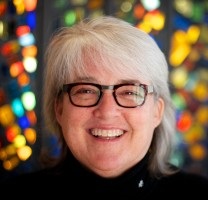Christians this Sunday will experience Easter in some of the ways the early Jesus followers did, thanks to the social isolation imposed by the COVID-19 pandemic.
“We in Western culture have become pretty addicted to routine and security,” said Doyle Sager, lead pastor of First Baptist Church in Jefferson City, Missouri.

Doyle Sager
“This year has actually added a poignancy and intensity to Holy Week from all that I’m observing in my own heart and in my congregation.”
Sager said his church is grieving the loss of family get-togethers and Easter services. There is also a high level of uncertainty about the future that early Christians knew all too well.
But he senses courage, as well.
“I also have picked up in people a resilience that says, you know, we will make do. We will find a way to make this happen,” he said.
Many are looking to familiar traditions in these times and the sting of not being able to participate in rituals is heightened, said Nancy Petty, pastor of Pullen Memorial Baptist Church in Raleigh, North Carolina.
One lesson Petty said she’s pondering is that Easter is not tied to one event, day or moment.

Nancy Petty
“The message of Easter is hopefully happening all the time wherever and whenever we see life coming out of dead places,” she said. “That’s an Easter moment.”
Petty said it’s important for Christians to live the cycles of the Christian calendar because they provide spiritual identity.
“These themes are playing out in our lives spiritually and emotionally – and even physically, at times – all year long,” she said. “In that sense, what we celebrate maybe this Easter is with a new awareness and with a new understanding.”
Steve Braun, a member of Pullen Memorial since 1987, said he will miss the Easter traditions which include baptisms and bell-ringing.
“That has a special place in my heart,” Braun said.
The dogwoods and azaleas blooming in Braun’s yard, however, have provided him an Easter meaning. He encouraged others to look for signs of Resurrection in their lives.

Steve Braun
“These types of things happen year-round, where dead places in our lives come alive,” he said. “Easter is not time-bound – it can happen year-round.”
There are often moments of clarity in times of significant change, said Elizabeth Mangham Lott, senior pastor of St. Charles Avenue Baptist Church in New Orleans, Louisiana.
“This time of COVID-19 lockdown is allowing us to really examine what matters most in our individual lives, but also what matters most in our faith community,” she said.
Lott said that stripping away the extra things gives people the opportunity to ask themselves what matters most at Easter.
“Maybe this is the first time that, collectively, we’ve entered Holy Week feeling all of these things that the people who were following Jesus were also feeling,” she said. “We’re mirroring the story this week, which is kind of a remarkable opportunity.”

Elizabeth Mangham Lott
Sager noted that this is not the first time people have had to celebrate Easter without services. Prison inmates, prisoners of war, the elderly in care facilities and persecuted believers around the world routinely share this experience.
“When we get past some of the grief and self-pity, we realize if we really believe the Resurrection message that Christ is risen and is everywhere, we can find a way to make this work.”
Sager predicted that believers will discover new, rich Easter traditions that bless them and others, even something as simple as calling someone who is alone or shouting hello to a loved one from the street.
“We can make our own new traditions for Easter if we’re isolated,” he said. “We can bake something special or have a peanut butter sandwich out under the tree with loved ones.”
Lott added that the message of Easter must be remembered in dark and confusing times.
“It’s not just that we go to grandma’s house and eat her potato salad,” she said. “The story that we are about to remember this weekend is that the radical love of God can change, and has already changed, everything. That’s the promise that we’re holding to.”
Read more BNG news and opinion on this topic:
#intimeslikethese
